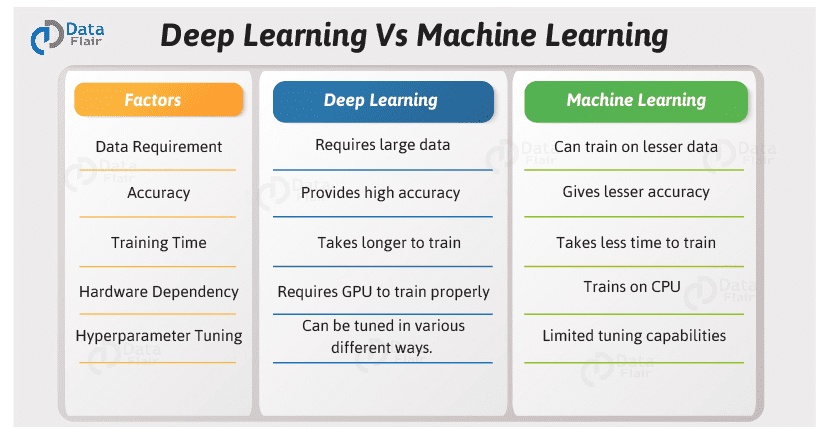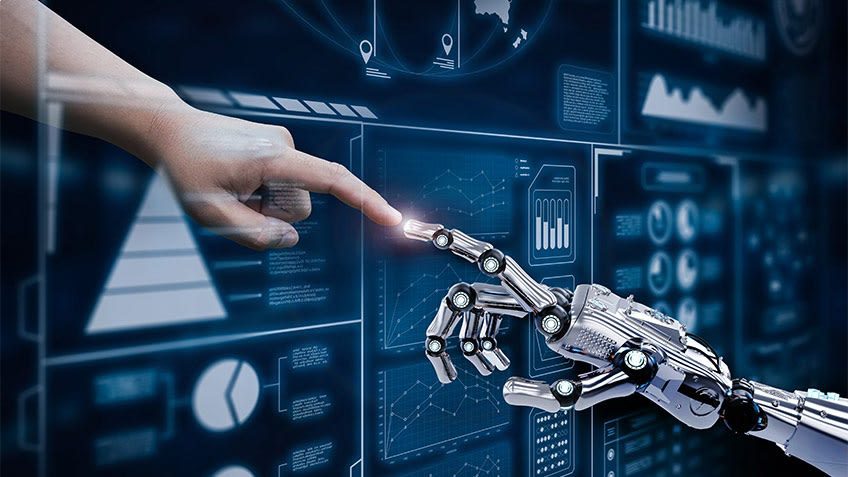Are they Different?? Are not they the same? What is the difference? Why is the difference? Are we digging deeper in Machine Learning with Deep Learning? All the above queries will get answered below. Be the first to read till last.
Similarities Between Deep Learning & Machine Learning

Knowing the difference would be very practical if we know the similarities. Practically, deep learning is just a subset of machine learning, while ML is Artificial Intelligence itself. Deep Learning technically similar to machine learning and its functions. However, its capabilities are different. We are living in a world that gets carried away with buzzwords easily.
To understand the differences, we have to understand their processes and functioning. According to Mr. Andrew Ng, the chief scientist of search engine Baidu and one of the leaders in the Google Brain Project, in an analogy which he shared with Wired Magazine.
“I think AI is kin to building a rocket ship. We need a huge engine and a lot of fuel to build the ship. If we have a large engine and a tiny amount of fuel, we will not make it to orbit, or if we have a tiny engine and a ton of fuel, we can not even lift off. To build a rocket, we need a huge engine and a lot of fuel”. The analogy means that the rocket engine is the deep learning model, and the fuel is the large amounts of data we can feed to these algorithms.
So yes, we are digging deeper into machine learning.
Major Differences

Human Intervention
With machine learning models, a human needs to identify and hand-code the applied features based on the data type (as an example, pixel value, shape, orientation, etc.). A deep learning model tries to learn those features without additional human intervention.
Hardware Requirement
As a large amount of data is processed and the complexity of the mathematical calculations involved in the algorithms used, deep learning systems require much more powerful hardware than simpler machine learning systems. An example of hardware used for deep learning is graphical processing units (GPUs). ML models can run on lower-end machines because it needs less computing power.
Execution Time
Due to the large data sets and many parameters and complicated mathematical formulas involved, a deep learning system can take a lot of time to train. ML can take as little time as a few seconds to a few hours. But deep learning can take a few hours to a few weeks.
Approach To Problem
Machine learning uses algorithms that tend to parse data in parts, and then those parts combine to come up with a result. Deep learning models look at an entire problem or scenario in one fell swoop.
Types Of Different Models
| Machine Learning | Deep Learning |
| Supervised learning | Convolutional neural networks |
| Unsupervised learning | Unsupervised pretrained networks (UPN’s) |
| Reinforcement learning | Recursive networks |
| Recurrent neural networks |
Examples To Differentiate
Giving examples to distinguish things is the best way to make a proper understanding. A popular example of a machine learning algorithm is Netflix’s recommendation system. For the service to make a decision about which new series to recommend to the user, machine learning algorithms associate the user’s preferences with other users. It would be a good example to differentiate, is like we’ve programmed the Deep Learning model to turn on a light when it recognizes the term ‘Turn On’.
Read more – Check out the best webinar platforms in 2021
At its initial stages of learning, it might turn the light on with any sentence containing those switching words. As the model is trained with deep neural networks, it will start responding with similar terms like “I can’t see” or “It’s dark” after many learning stages. A DL model can learn through its method of computing that makes it seem like it has its own brain.
Software testing solutions have advanced in recent years to incorporate both machine learning and deep learning capabilities. Machine learning helps with recognizing UI elements even as they are restyled, moved, and completely changed. Deep learning helps to understand the real intent of the test and make decisions, just like a human.
Also Read: Why Google Stadia Could Shake Up the Gaming Industry?


5 comments
[…] of deep learning vs machine learning, it is crucial to first establish a clear understanding of what is deep learning vs machine learning. Deep learning refers to a subset of machine learning techniques that aim to tackle complex […]
[…] domains. One crucial distinction that remains at the forefront of AI research and application is deep learning vs machine learning. Understanding and leveraging their differences is vital to building intelligent systems that […]
[…] exploring the intriguing realm of artificial intelligence, one can’t ignore the secrets of deep learning vs machine learning. Understanding the differences between these two powerful methodologies is fundamental in […]
[…] order to fully understand the complexities of artificial intelligence, it is crucial to delve into the power of deep learning vs machine learning. By examining the strengths and weaknesses of each approach, we can better discern their distinct […]
[…] In this article exploring the key differences between deep learning and machine learning, we delve into the core principles that set them apart – the fundamentals of deep learning vs machine learning. […]